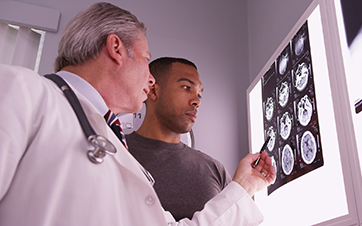
The symptoms of brain tumors can be subtle and easily overlooked, making early detection and treatment a challenge. However, with advances in research, treatments and outcomes have improved significantly over the years.
In Connecticut, there is ongoing research and efforts to better understand and treat brain tumors. In this blog, we'll look at brain tumor symptoms in teenagers, kids, and adults.
Whether you're looking for information on symptoms or treatment options, this blog has everything you need to know. So, let's dive in and learn more about brain tumors and their signs and symptoms.
What Are Brain Tumors?
Brain tumors are abnormal growths of cells within the brain. They can be either benign (non-cancerous) or malignant (cancerous).
These tumors can develop from different types of cells within the brain and can occur at any age. The growth and location of the tumor can affect various functions of the brain, leading to a range of symptoms.
Brain tumors can be diagnosed through imaging tests, such as MRI or CT scans. Treatment options may include surgery, radiation therapy, and/or chemotherapy.
Types of Brain Tumors
There are several types of brain tumors, which can be classified based on their location, cell type, and whether they are benign or malignant. Some common types of brain tumors include:
Gliomas
These are tumors that develop from glial cells, which are supportive cells in the brain. Gliomas are the most common type of brain tumor. They can be further classified as astrocytomas, oligodendrogliomas, and ependymomas.
Meningiomas
These are tumors that develop from the meninges. They are the protective membranes that cover the brain and spinal cord.
Pituitary Adenomas
These are tumors that develop in the pituitary gland. This gland is at the base of the brain and controls hormone production.
Schwannomas
These are tumors that develop from Schwann cells. These cells form the protective sheath around nerves.
Medulloblastomas
These are malignant tumors that develop in the cerebellum. This part of the brain controls movement and coordination.
Craniopharyngiomas
These are tumors that develop near the pituitary gland. They can affect hormone production and vision.
There are also other, less common types of brain tumors, such as lymphomas and germ cell tumors. The type of brain tumor a person has can affect the treatment options and overall prognosis.
Brain Tumor Symptoms in Teenagers
Brain tumors can affect anyone, including teenagers. Symptoms in teenagers include headaches, vomiting, blurred vision, and difficulty walking. If you or someone you know is experiencing these symptoms, it's important to seek medical attention at once.
Brain tumors can also cause seizures, changes in personality, and difficulty concentrating. These symptoms can be alarming and confusing for teenagers. It's important to provide them with support and information. It's also essential to get a proper diagnosis and treatment plan from a medical professional.
Research on Brain Tumor Symptoms in Connecticut
Connecticut is home to some of the leading medical institutions in the world, including Yale New Haven Hospital and the University of Connecticut Health Center. These institutions conduct research on brain tumor symptoms and treatment. This research helps to advance our understanding of this complex condition.
One study conducted at Yale New Haven Hospital found that a certain type of brain tumor in children had unique symptoms. These symptoms include sudden weight gain and puberty at a young age. This research has helped doctors to better identify and treat these tumors, improving outcomes for children and their families.
Brain Tumor Symptoms in Kids
Children can also experience brain tumor symptoms, and it's important to be aware of the signs. Some common symptoms of brain tumors in children include headaches, nausea, vomiting, and difficulty with balance and coordination.
In some cases, brain cancer and tumors can also cause developmental delays, vision changes, and seizures. Children may not be able to express their symptoms in the same way as adults, so it's important to pay attention to any changes in behavior or physical ability.
Brain Health and Cancer Treatment
Maintaining good brain health is essential for everyone, but it's especially important for those undergoing cancer treatment. Chemotherapy and radiation therapy can affect cognitive function, memory, and attention, so it's important to take steps to support brain health during and after treatment.
Some ways to support brain health include getting regular exercise, eating a healthy diet, and engaging in mentally stimulating activities such as reading, puzzles, and social interaction. It's also important to get enough rest and manage stress, which can have a significant impact on cognitive function.
Brain Tumor Symptoms in Adults
Brain tumors can also affect adults, and the symptoms can be different than those in children and teenagers. Some common symptoms of brain cancer in adults include headaches, seizures, and changes in vision or hearing.
In some cases, brain tumors can also cause weakness on one side of the body, difficulty speaking, and personality changes. It's important to seek medical attention if you experience any of these symptoms, as they can be signs of a serious condition.
Cancer Treatment and Brain Tumors
Treatment for brain tumors depends on the type and location of the tumor, as well as the patient's overall health. Treatment options include surgery, radiation therapy, and chemotherapy.
In some cases, a combination of treatments may be recommended. There may be clinical trials available as well. It's important to work closely with your medical team to develop a treatment plan that is right for you
Donate to Support the Connecticut Brain Tumor Alliance
Brain tumors impact lives. Early detection and treatment are critical for improved outcomes. The Connecticut Brain Tumor Alliance provides vital resources, and support. It raises awareness for those impacted by brain tumors.
Your donation can fund research. It also provides patients and families with support. It will help to raise awareness of brain tumor symptoms in teenagers and others.
Together, we can help them make a difference in the lives of those affected by this disease. Please consider donating or volunteering your time to help support this worthy cause. Thank you for your support.
Disclaimer
All content and information on this website is for informational and educational purposes only and nothing herein shall be construed as medical advice. Always consult your medical provider for your particular needs and circumstances prior to making any medical decisions.

